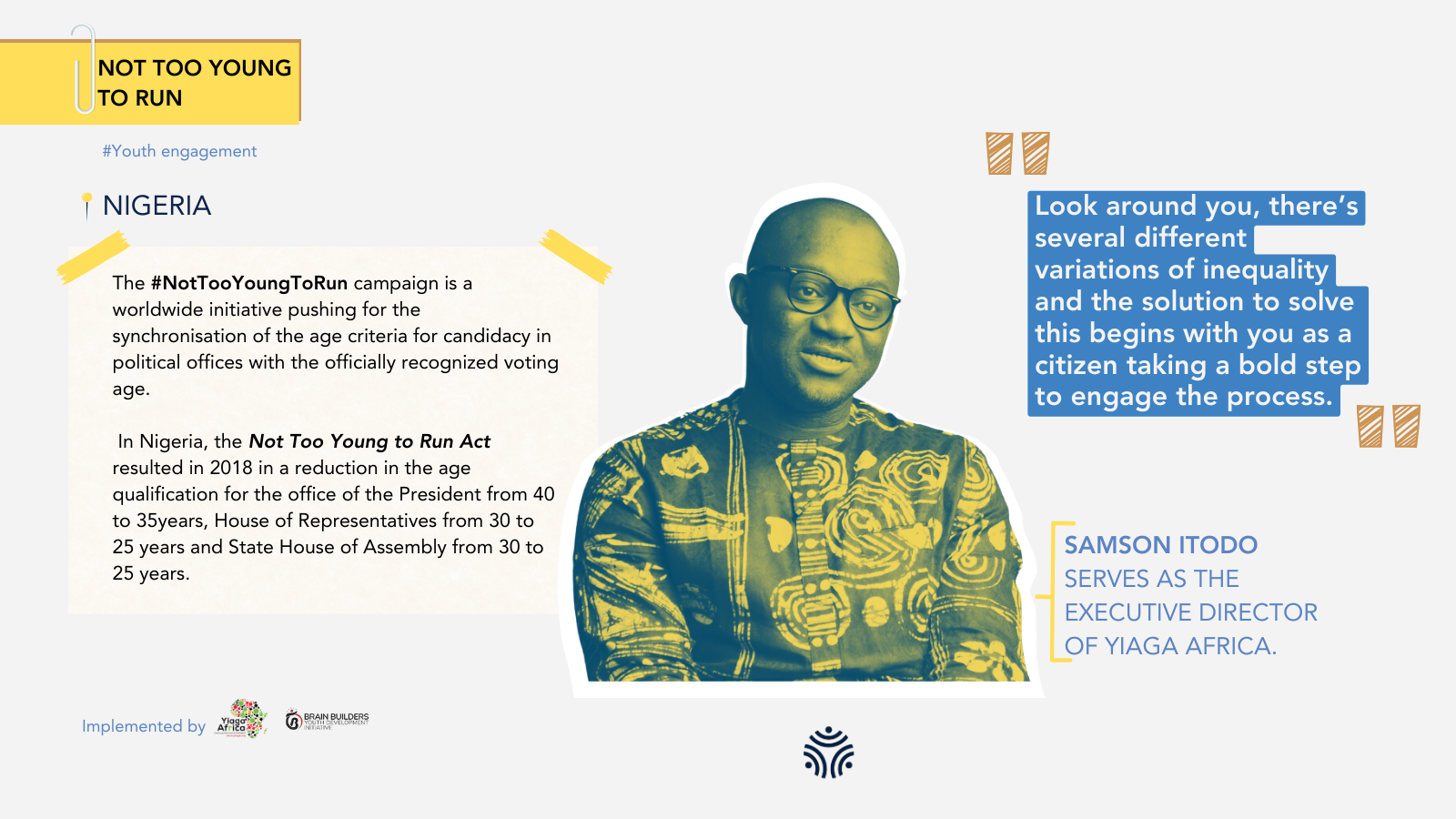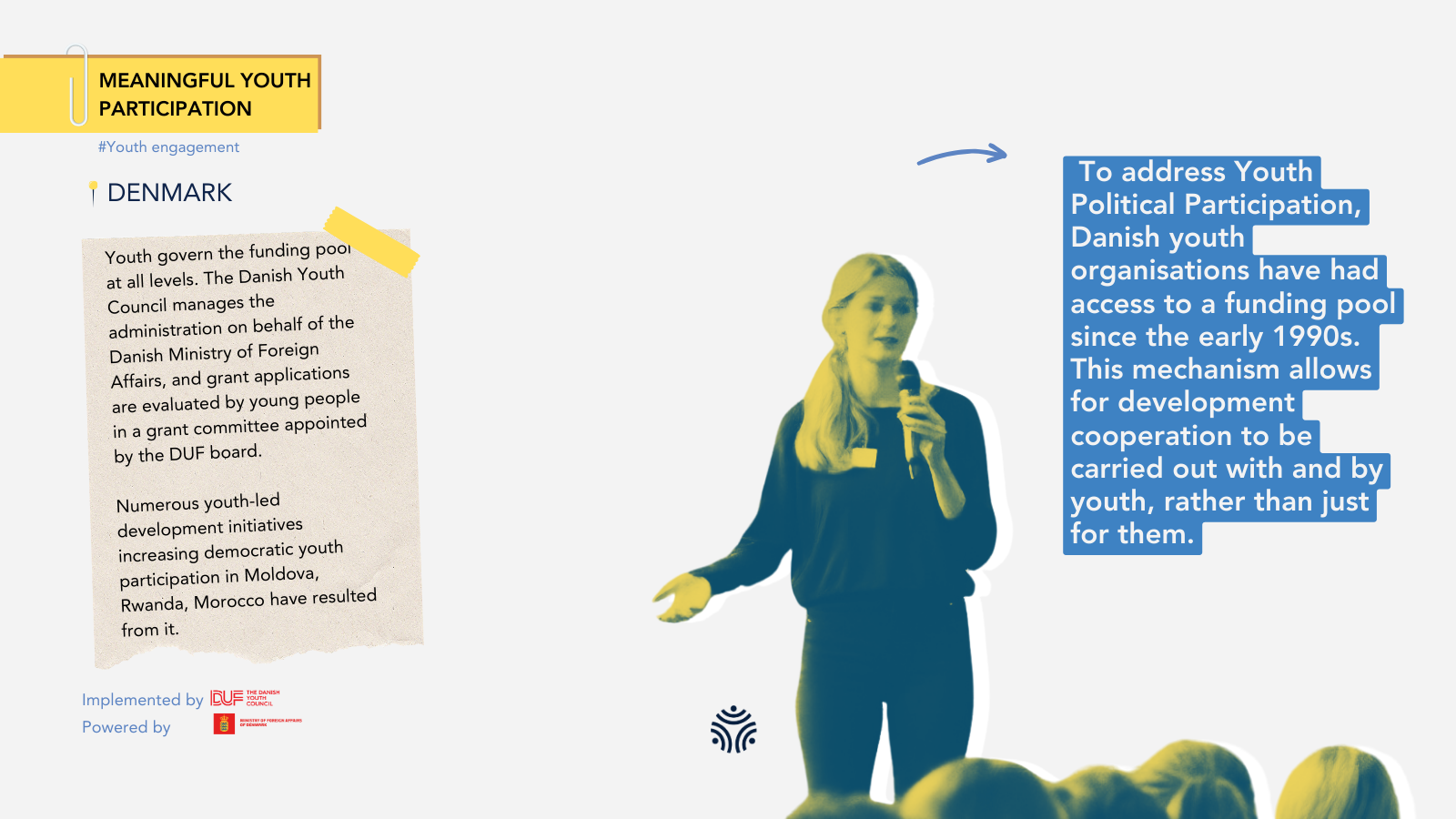
Ahead of the third edition of the Summit for Democracy, the Youth Democracy Cohort (YDC) relaunches the Menu of Possible Commitments with the aim of garnering momentum for greater improvement of youth political participation rights. In the next weeks, join us in celebrating how youth-led initiatives can benefit our democracies as we bring commitments to life through a series of articles and social media posts.

About the Author
Santiago is a Policy Officer at EPD – European Partnership for Democracy. He is responsible for coordinating the Youth Democracy Cohort and driving our engagement at the Summit for Democracy.
Santiago joined the EPD in June 2023 and is originally from Paraguay, although he has been living in Europe for the past seven years. He has previous experience in the NGO, international organisations and private sector.
Youth is perceived as increasingly disengaged from politics. However, how can we expect young people to be interested in traditional politics when they lack the avenues and tools to make their voices heard?
The large majority of political decisions in democracies are undertaken without input from young people aged 18 to 35. From climate change to education, the youth is marginalised from policy processes that directly impact them and their future. Participation mechanisms for young people are missing in many countries and where they exist, they are often not meaningful or institutionalised enough to ensure that their concerns are passed on to the authorities.
Democracy must not be considered complete when the voice of such a large demographic is underrepresented at the highest levels of policymaking. More crucially, democracy cannot deliver if young people’s inputs are not considered.
What research says
Young people suffer from an output, as much as an input problem. They struggle to contribute to policy outcomes since the mechanisms to hear their input are missing. Yet, research (see the work of Sarah Pickard) shows that young people become more engaged when governments make concerted efforts to “youth-proof” and “youth-enable” decision-making at all levels.
Governments, however, have shown reluctance in further integrating youth, often fearing that they are empowering potential voters for their political opponents. The result is a growing disconnect between public authorities and the younger generations. Several studies have shown how this manifests itself in growing apathy among young people and even support for non-democratic systems of governance.
In truth, rather than uninterested, youth are disillusioned with mainstream politics. Their apathy is being confused with a distrust in politicians and institutions. Instead, young people remain engaged in social causes through non-traditional methods, from social media to grassroots movements. Young people’s political passions are not dwindling, but rather evolving in their expressions.
In parallel, young voices can not be understood as homogenous. It remains a crucial concern to ensure that democracies do not leave behind the LGBTQ+ youth, people with disabilities, indigenous groups and other ethnic and religious minorities. Each of these stakeholders has unique views, challenges and perspectives that must be considered when seeking youth input.
Dispelling the myth of youth apathy
The third edition of the Summit for Democracy will have a particular focus on youth political rights and the Youth Democracy Cohort will be vocal about ensuring that youth are heard in their diversity and their ongoing passion for social causes. The ultimate responsibility lies within public authorities, from local governments to international organisations. Increasing the voice of young people in policymaking is one of three main pillars of the European Union’s Youth Action Plan while the African Union stresses the importance of young people actively participating in politics in their African Youth Charter.
As several studies point to how youth is becoming alienated from politics, policymakers must live up to their pledges and improve input mechanisms for young people to engage in politics. Youth potential is limitless and can serve to improve the inclusiveness of democracies. Only then will we restore the trust between people and institutions and dispel the myth that young people are disengaged and radical.
Success Stories on prioritising youth voices in governance
In the last year, the Youth Democracy Cohort has observed and supported young people in voicing their concerns and ideas when the opportunity was granted. Let’s dive into the innovative landscape of youth-led initiatives that we hope can inspire more change.
Commitment #1 : Impact of youth civil society in Nigeria
Ensuring youth input is included in legislative reform processes. This can happen through structured, continuous, and meaningful mechanisms, including substantive political and policy dialogues with national authorities.
Menu of Possible Commitments

The impact of the Not Too Young To Run (NTYTR) advocacy campaign in Nigeria shows how youth input can be included in legislative reform. The campaign successfully amended the country’s constitution to lower Nigeria’s age limit for elected office at various levels. Nigerian President Muhammad Buhari signed the bill into law in May 2018, following a two-year long campaign led by YIAGA Africa and various other youth organisations across the country.
Brainbuilders, a youth organisation currently supported by the Youth Democracy Cohort, played a pivotal role in the campaign, advocating for greater youth representation in government. After the passage of the law, the number of young people in elected positions has increased. The state of Kwara appointed the youngest commissioner for youth in the country for two terms, emphasising the prioritisation of young voices in key government positions. The impact was also extended to increased gender representation, as the Kwara state cabinet saw the election of around 55% women representatives.
This success story shows the concrete results of youth advocacy and collaboration, highlighting the positive changes that occur when young people actively shape the political landscape and when their voices are supported.
Commitment #4: Grants by the Danish Youth Council – Meaningful Youth Participation In Denmark’s Development Cooperation And Beyond
Creating, supporting, and funding relevant national youth policies and frameworks.
Menu of Possible Commitments

The Danish Youth Council (DUF) has been active in its support and funding of national youth policies. Under the Ministry of Foreign Affairs, the DUF provides grants to various Danish youth organisations to implement initiatives globally. Implemented by a democratically-elected youth board, this approach has produced numerous successful projects to increase youth participation in countries such as Rwanda, Moldova, and Morocco. These projects are not only empowering but also enable young people to drive democratic change and combat discrimination through effective peer-to-peer approaches.
Additionally, The DUF board appoints eight youth delegates to represent the nation’s youth in political decision-making in areas such as education, climate, and health. The youth delegates also join the Danish delegation at United Nations sessions, including the UN General Assembly and the Commission on the Status of Women. The Danish government often allows the delegates to take the floor and speak on behalf of the country, as well as entrusting them with negotiating relevant UN resolutions.
Commitment #5: The National Youth System of Costa Rica
Strengthening the independence, transparency, and inclusivity of National Youth Councils and similar coordinating structures
Menu of Possible Commitments

Costa Rica’s National Youth System stands out as another compelling example of commitment and policy success, demonstrating its dedication through the repeated implementation of initiatives such as three editions of their National Youth Survey or the approval of the ‘Public Policy for Youth 2020-2024’. Costa Rica is committed to strengthening the independence and transparency of their youth institutions.
The National Youth Council is responsible for elaborating and executing youth policy under the overall guidance of the Vice Ministry of Youth. Young people are represented through several participation mechanisms, including regional (Cantonal) youth committees that include young people from marginalised communities. The fourth youth actor is the National Youth Advisory Network Assembly, which is composed of youth from several sectors of the citizenry. The Network has been important in independently advocating for reforms, such as greater youth inclusivity in the strategy of the Ministry of Labour.
Join the campaign
These are only a handful of examples of the positive impact that greater youth input can have on democratic governance. Join the YDC in calling for youth to be heard at all levels of policy-making by sharing the commitment that resonates with the issues in your community and by showcasing your own success stories with the hashtag #YouthInAction.